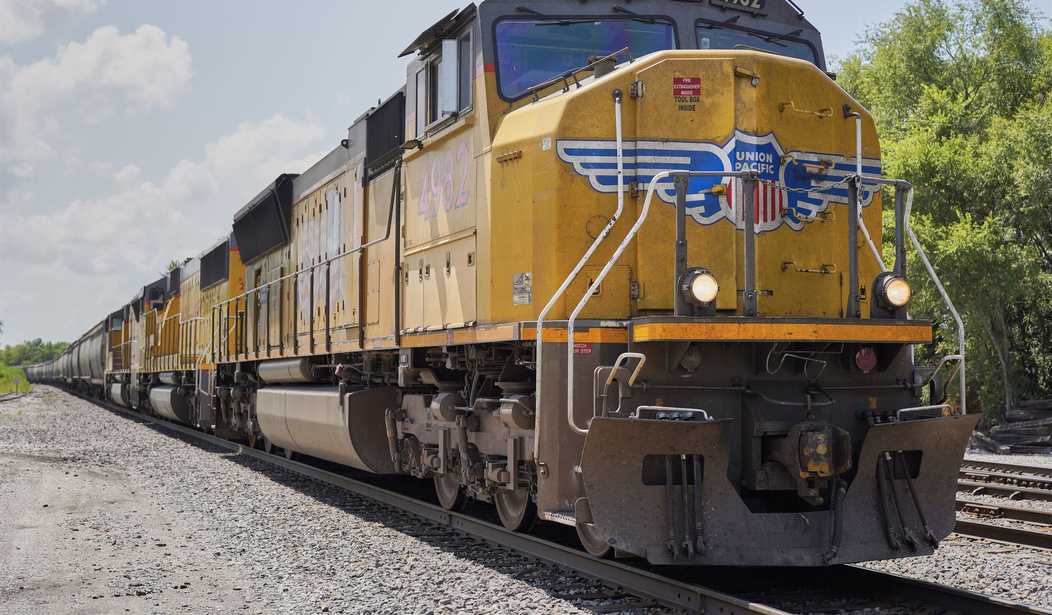The looming railroad strike was delayed until after the midterm. One might believe this was a political calculation by Democrats and union leadership. As the possibility of a negotiated settlement between the unions and management evaporates, the only available remedy is political. The irony of the “most labor-friendly president,” Scranton Joe, having to sign a bill to force workers to return to work cannot be overstated. Yet, on Monday, he asked Congress to mandate the Tentative Agreement recommended by the Presidential Emergency Board (PEB) and remove the threat of a legally sanctioned railroad strike.
The rail unions are already criticizing Biden for calling to take away their right to strike and touting the Tentative Agreement. Rail unions representing more than 55% of all railroad workers voted down the Tentative Agreements in recent weeks. The primary sticking point is the allotment of paid sick days. “President Biden is now touting the Tentative Agreements that the majority of union members had voted down, despite that none of them contain any sick time whatsoever,” according to Railroad Workers United (RWU) Co-Chair and conductor Gabe Christenson.
“The ‘most labor-friendly President in history has proven that he and the Democratic Party are not the friends of labor they have touted themselves to be. These wolves in sheep’s clothing have for decades been in bed with corporate America and have allowed them to continue chipping away at the American middle class and organized labor.”
RWU Treasurer Hugh Sawyer was blunt. “Joe Biden blew it. He had the opportunity to prove his labor-friendly pedigree to millions of workers by simply asking Congress for legislation to end the threat of a national strike on terms more favorable to workers. Sadly, he could not bring himself to advocate for a lousy handful of sick days. The Democrats and Republicans are both pawns of big business and the corporations.”
Sen. Bernie Sanders is vocally pushing for an additional seven days of paid sick leave. He intends to block consideration of the House legislation in the Senate unless they are included. Apparently, Speaker Nancy Pelosi is taking his comments seriously because, according to her office, the House will consider strike-averting legislation by voting on whether to adopt the Tentative Agreement, as negotiated by the railroad companies and labor leaders based on the PEB recommendations. Then House members will have a separate, up-or-down vote to add seven days of paid sick leave for all rail workers to the Tentative Agreement.
Recommended: Working to Save the Energy Grid From ESG Investing
The Association of American Railroads (AAR) is objecting to Speaker Nancy Pelosi’s public statement. The AAR objects to the additional sick leave benefit vote and believes it will undermine collective bargaining in the future by shattering precedent. President and CEO Ian Jefferies said, “Just last night, President Biden spoke clearly on the appropriate need for Congress to implement the agreements already ratified by eight of the twelve unions, which represent a clear pattern. Doing so was never anti-worker; in fact, it would reward all rail workers with historic deals — particularly those who already ratified — as well as the millions of workers across the economy who would suffer from a rail strike.”
Jefferies continued, “Now, after the Speaker stated publicly this is the most prudent path, the House is considering a new measure to the equation based on the wholly false premise that rail employees do not get paid sick leave. The ramifications of approving such a measure would disincentivize future voluntary agreements for freight railroads, Amtrak and airlines if a party in bargaining believes it can obtain a better deal from Congress than it could through good faith negotiations and the statutory PEB process under the Railway Labor Act. This ignores over 100 years of precedent and clearly usurps longstanding bargaining procedures.”
Jefferies is correct about the impact on future bargaining. When federally regulated employees want something their employer won’t agree to, they will push the process to Congress to solve. Adding the vote will encourage that behavior if it passes and anger the workforce if it does not. Pelosi could have just taken the vote on the Tentative Agreement, as history would suggest. Now she has placed her caucus in a no-win situation.
Progressive House members, like the Squad, will have the opportunity to give the thumbs up to the additional sick days. Whether Pelosi intends to whip her entire caucus is not clear. The president said members of Congress should not push for changes to the deal as they could risk a delay. If the president does not sign the legislation by Dec. 9, the rail workers may legally strike, causing debilitating supply chain delays.
UPDATE, 3:45 p.m.: The House voted to implement the Tentative Agreement to avoid a strike. In a narrowly passed second vote, it added the seven days of paid sick leave at issue between the parties. The AAR is calling on the Senate to pass the tentative agreement without the enhanced sick leave benefit.










Join the conversation as a VIP Member